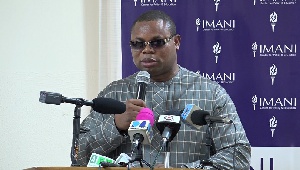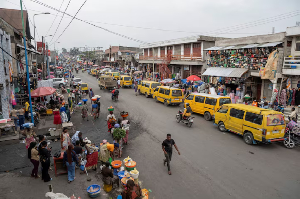A FEW RED FLAGS OVER GHANA’S 2009 BUDGET
By Bright B. Simons & Franklin Cudjoe (06/03/2009)
We should commend the Honourable Minister of Finance for a valiant effort at producing a relatively bold and comprehensive budget for 2009. The document and the parliamentary address that launched it were replete with lofty sentiments and noble intentions. Every emphasis was on: “social democratic agenda”, a phrase interpreted to be synonymous with “pro-poor”.
But few will disagree that in economics and politics great intentions do not always lead to great results, and for that reason it behooves on civil society organizations such as ours to be forceful in our duty of pointing out potential chasms in the 300-page document that might lead to implementation risks in the months ahead. While it is true that a budget statement is essentially a list of projections, it is also very true that it is a blueprint that guides government action, so that when such a vital document contains problematic elements there is every possibility that government program for the year, and even for subsequent years, could be severely derailed.
In the next section, we will run a general commentary on facts and figures we found interesting in the budget. The final section will highlight what we believe to be red flags deserving of the attention of both civil society and government stakeholders.
INTERESTING ITEMS
The Honourable Minister did an accurate analysis of the challenges facing the administration as a result of the “twin deficits” plaguing the current and balance of payment accounts. Nevertheless he was emphatic that not only is the Administration still focused on creating real jobs, ensuring access to basic necessities and a lifestyle of dignity for all citizens regardless of class, as well as the provision of healthcare, education, and a dignified retirement for senior citizens, he was also adamant that this was the right budget needed to begin delivering on these ideals.
The Minister affirmed the NDC’s reintroduction of the Vision 2020 program, previously converted into a Vision 2015 program by the erstwhile NPP Administration. Many observers see this partisan wrangling as merely pedantic, and of little bearing on real economic policymaking. They draw attention to the fact that “middle income status” could be reduced to a play of semantics by varying the parameters of estimation such as PPP etc. Some have said that a per capita income $1000 is sufficient a marker of this status. If that were indeed the case then the country will automatically reach that status before 2014 based on the current GDP growth rate. But that merely raises another contention.
The GDP growth rate has itself come under some controversy, resulting in the budget committee choosing to refer to the figure of 6.2% used in the budget as provisional. Some speculate that 7.2% was at one point the figure under consideration. One hopes the latter is nearer to the truth, because given our high population growth rate, a 6.2% growth would imply a per capita growth rate of 3.4%, and as every first year economics student will attest, the per capita factor is the primary determinant of living standards. In fact we would muddy the waters further by controversially introducing another factor, rarely considered in GDP calculations: the depreciation of gross capital investment. At our level of development the capital stock is at such a level that its depreciation (roads that don’t last more than 2 years etc.) might prove more determinative than might be the case elsewhere. We would even deepen the controversy further by assigning a 2.5% depreciation rate, conjecturally based but also informed by trends in the private sector infrastructure development market. With flourish, we could then announce that the “real growth rate” is 0.9% (!) and then retire in glee as better informed analysts close in to crucify us. But the point should be made one way or the other: the current din over the growth rate is unlikely to provide more insight over confusion.
All the above notwithstanding, the Honourable Minister appeared committed in his speech to dampening our expectations of economic growth for the near-term. He seemed wildly pessimistic about the impact of the Global Economic Crisis (GEC) on Ghana in coming months – more so than some of us, we must admit. Then he mentioned the downward pressure on the cedi, likely falls in commodity prices and the specter of inflation. He also promised that government will prevent over-leveraging in domestic markets. We were puzzled to know whether that meant going beyond Basel II. Our own view is that anxiety about over-leveraging is probably more a luxury than a necessity for a treasury man with bigger fish to fry. High capital adequacy compliance and the obvious risk-aversion to innovation exhibited by our banks leaves one to wonder where such “over-leveraging” would emanate from. We will return to the “pessimism” issue later on, when it is most relevant to the analysis.
Where the domestic environment is concerned, we concur fully with Dr. Duffuor that the cause for immediate anxiety is more pronounced. The macroeconomic targets for 2008 were sorely breached – no doubt about that. Overexpenditure by Ministries, Departments and Agencies (MDAs) were frightening in some instances. Spending on personal emoluments grew by over 24% - not surprising in a context in which statutory expenditures and discretionary payments overshot by 31% and 33.5% respectively. As if on cue Broad Money swelled by 40% (compared to 36% in 2007 – another expansionary year), according to the Minister, on a “basis of trade and consumption”.
Confronted with what appeared to them to be an overheating economy, Dr. Duffuor and his team appear to have relegated “single-digit inflation” from the foreground to a medium-term goal; and prioritized current account deficit reduction, fiscal management strengthening, coordination of fiscal and monetary policy and the stabilization of the GDP-to-Debt ratio as the key technical focuses. On the program side, agriculture is to receive a boost, while the previous government’s love affair with the phrase “public-private partnership” appeared to have been retained with a host of other public management tools. It wasn’t clarified though whether the present Administration intends to maintain the domestic debt – to – GDP ratio as the fiscal anchor.
While one cringes at the thought of quarreling with the lofty goals espoused in the budget statement: “fair distribution of economic growth proceeds”, “smoothening out market failures”, “addressing intergenerational inequity”, “fixing the existing social and economic order” and widening access to “basic technology”, one is nevertheless compelled to worry whether such objectives can be attained when the chief obstacles to economic management appear to have been left untouched. To be fair, the Minister did mention that several “reviews” were underway, but this does not offer any consolation as the policy direction is already obvious in the numerical projections.
The consolidation of the existing 27 ministries into 24 cannot be viewed as a major pro-efficiency reform if there is no intention to reduce the staff employed in these places. The cost of maintaining a ministerial office is not negligible, but it is not very significant either. Ministers and their perks (including Special Assistants, Spokespersons) are moral irritants to most of us uptight armchair commentators but even a GHC100,000 pricetag per portfolio may be exaggerated. We all know where the real costs are – general personnel remuneration. It is disappointing that Dr. Duffuor failed to cost, element by element, the exact savings to the nation as a result of the proposed cost-cutting measures such as reduction of ministerial travels by 50% etc. We are skeptical that the savings would amount to much. Which is why notwithstanding these consolidations, public sector expenditure will rise from 65% in 2008 to nearly 70% of total public revenues and 12% of GDP in 2009.
Likewise, it is worrying that while acknowledging the fiscal character of the ongoing deterioration of State-owned enterprises’ (SOEs) balance sheets, Dr. Duffuor and his team had very little to say about the main difficulty facing these entities: under-recovery of costs due to reckless government interference with their operating environment. To promise recapitalization without voting considerable funds for it, and to refuse to commit government to either full direct subsidization or acquiescence to full cost recovery by the SOEs, is to significantly devalue government’s industrial policy for the coming year.
It is also not clear how Government proposes to reduce debt servicing from 17% of payments in 2008 to 14% in 2009 when carry-over effects of 2008’s deficit financing, reserve fund depletion, arrears (for which some GHC533m has been voted in the budget), and SOE’s financial distress in 2008 all point to higher debt servicing (even accounting for lower deficit financing for 2009 itself).
We were also puzzled to find the money voted for the laudable Savannah Accelerated Development Agency (SADA) bundled together with funds for a strategic oil reserve and “other projects”. How much exactly is being allocated for SADA? The GHC344 million allocation for the combined items could easily be swallowed by just the Strategic Oil Reserve alone if government deems it appropriate, for instance, to build three months cover for oil imports (~GHC 350 million).
As far as the reduction of taxes on petroleum is concerned, we are less worried than are other fiscal-prudence commentators. It is true that the final level of ex-pump prices will be too low to be passed on to passengers of commercial vehicles, much less through the transport component of trading costs and eventually to the spot prices of consumables. Nevertheless the ripple-through effects will be felt by logistics and other transport-related operations of businesses, leading to improved cost performance. More importantly, the Minister very shrewdly targeted a component of the revenue stream that has been underperforming relative to direct taxes such as income tax (petroleum taxes were 4.2% lower in 2008 than in 2007). Then he used the cover to hike up excise rates again, after a well-coordinated campaign by importers had created some respite last year.
All aforementioned issues are deserving of attention, but in the next section we will focus on what are in our opinion the most worrying aspects of the budget.
RED FLAGS
1. A Damoclean sword hangs over the revenue projections in the 2009 budget. After such a good job frightening all of us out of our wits with his gloomy descriptions and forecasts for the world economy, Dr. Duffuor then moved rapidly on to pencil in a GHC500 million expansion in grants receipts. He adds another billion dollar expansion in revenues for 2009, and (you can insert “flourish of trumpets” here) produces a budget for “lean times” that anticipates that government will spend about GHC250 million more this year than it did last year, while at the same time slashing the deficit from 14.9% of GDP (non-divestiture adjusted) to under 10% and accommodating a drawdown on the Sovereign Bond and vastly-reduced divestiture proceeds (the 2008 figure was GHC1billion). Astounding, is all we can say.
We are mindful of the renowned banker’s credentials and experience, but even so a healthy dose of skepticism is warranted.
Apart from a Government of Spain facility of about $44 million and tortured delivery timelines, no indication is provided as to why we should expect a sudden upward trend in grant giving from an economically battered West (and China isn’t faring too well either). Consider also that 2008 grant receipts declined by 4.3% over 2007 levels. Loans, already growing at over 36% a year, are expected to amount to a GHC1billion up from less than GHC670m in 2008.
Despite a downward revision of petroleum prices, and without an explanation for an assumed expansion in consumption volumes, petroleum taxes are expected to increase from GHC386m to GHC436m in 2009.
Direct tax revenues are expected to increase by 24% over last year’s figures. True, a 50% increase in Airport taxes has been announced but with international arrivals of less than 1 million per annum (according to the Ghana Statistical Service, 583,000 arrived in 2004), this tax hike won’t bring in more than $20 million. Consider also that tax revenues have been growing aggressively already prior to the current downturn. Direct taxes for instance grew by 33% in 2008 compared to 2007. There is a natural constraint to widening the tax net. True, 80% of workers are employed in the informal sector, who presumably could be progressively “ensnared”; but of these at least 60% are farmers and fishermen, and no politician could ever bring himself to tax them.
Nor is it satisfactorily explained why there will be a doubling of “exceptional financing” proceeds from GHC77m to GHC134m, when it has been acknowledged that most of 2008’s inflows were due to bilateral debt relief and no account has been given regarding why an upsurge is expected in 2009.
The usual notion, sad as it may be, is that Western nations put new African governments on probation before deciding whether to shower them with largesse. Moreover, MDRI (Multilateral Debt Relief Initiative) and MDBS (Multi-donor Budget-support) proceeds are usually stable flows, which is why Dr. Duffuor correctly projects only modest growth.
Of course the MOFEP budget team’s optimism about receipts is in conformance with the need to justify a 28% increase in statutory payments in 2009, when the figure for last year already represented a 36% increase over 2007. The galloping inflation in public sector expenditure in the last couple of years is obvious for all to see, but government of Ghana continues to shrink from the hard choices it confronts.
Instead of facing up to the two 800-pound gorillas in the room – the ballooning public sector wage inflation (over 42% of discretionary payments in 2009) and the underrecovery of costs by quasi-fiscal, so-called state-owned enterprises, government of Ghana has instead come up with a lukewarm policy of improving public finance management and boosting administrative efficiency. Here, both the NPP and NDC variants of GoG have been equally blameworthy. In this budget the phenomenon has manifested in a series of arithmetic gymnastics involving slashing part of the funds allocated to Administration expenses and assigning it to the Personal Emoluments account, and then immediately declaring on the foregoing basis a reduction of Administration (Item 2) expenditure from GHC412m to GHC266m.
Service expenditure is reduced from GHC235m to GHC149m on account of a reduction in “profligate spending” by MDAs – commendable, but insignificant in the wider scheme of things. As for the creation of a single Treasury Single Account to consolidate various fund accounts, standard organizational psychology predicts an increase in transaction costs in the near-term as state actors struggle to adapt. In the medium-term, savings may accrue but certainly not on a scale to impact the stability of the fiscal regime.
We appreciate that the Minister is working under enormous constraints, and that there are rarely any silver bullets in economics. We are also thankful for the increased social investment (GETFund gets GHC275m compared to GHC204m in 2008, while NHIS gets GHC375m compared to GHC256m), and the increase in the capitation grant as well as the free school uniforms. The decision to curtail tax exemptions based on good-clearance permits also seems to indicate a sound understanding of the unintended consequences of blanket facilitation measures.
What we are disappointed about is that he seemed to have missed an opportunity to frontload the bold decisions at the time when goodwill for the government is highest.
The political costs of taking the bold but necessary decisions needed to get Ghana on a growth path, at a significantly higher level than the projected 5.9%, and therefore on a course more likely to transform the nation’s per capita economic status, will grow more and more exorbitant as the mid-term fatigue approaches, and we wished Dr. Duffuor and his Employer had seen things that way.
Which, of course, is far from suggesting that we would like to be in the renowned banker’s shoes at this time.
Bright B. Simons and Franklin Cudjoe are affiliates of IMANI – Ghana, vited the 6th most influential think tank this year by Foreign Policy Magazine.
Opinions of Wednesday, 11 March 2009
Columnist: Franklin Cudjoe














